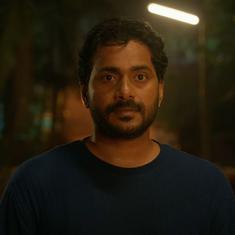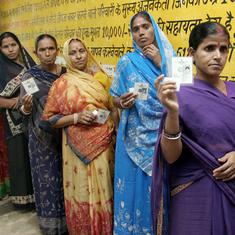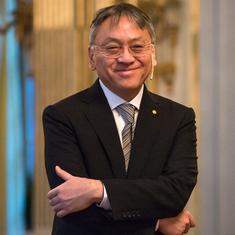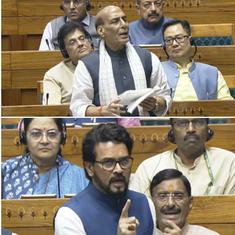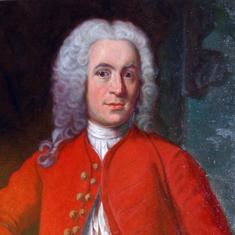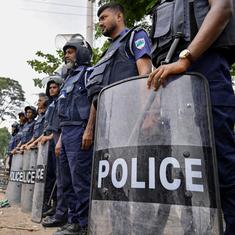Jharkhand’s former CM Shibu Soren dies at 81
He was admitted to the Sir Ganga Ram Hospital in New Delhi for more than a month and was undergoing treatment for kidney-related ailments.
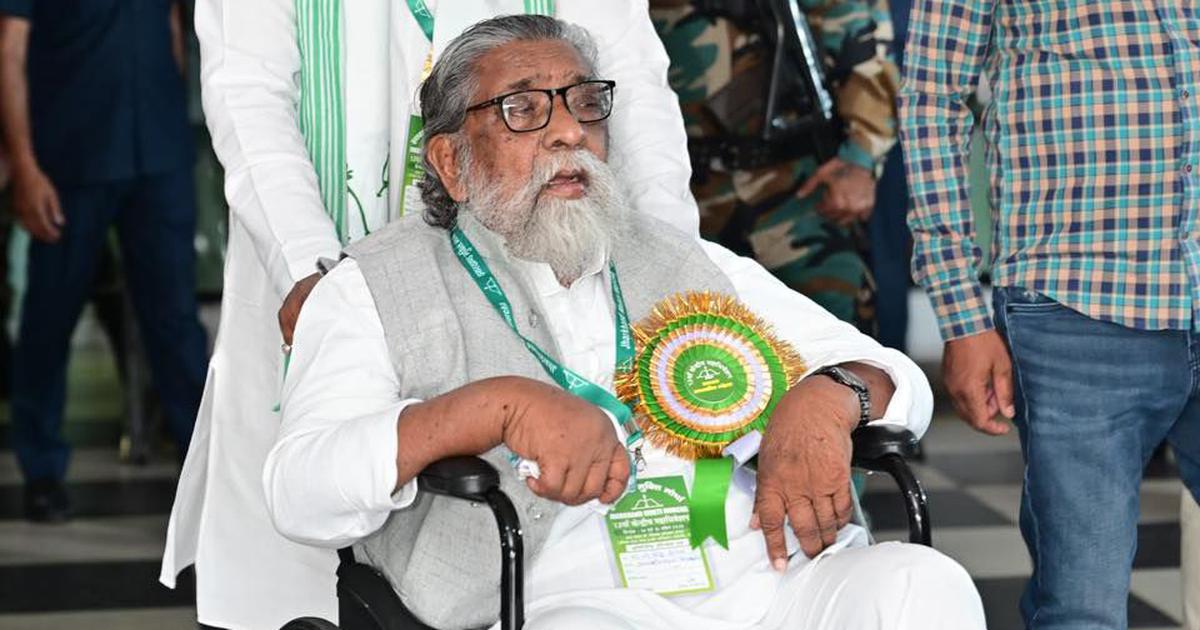
Jharkhand’s former Chief Minister Shibu Soren died on Monday at the age of 81.
He was admitted to the Sir Ganga Ram Hospital in New Delhi for more than a month and was undergoing treatment for kidney-related ailments.
Soren was the leader of the Jharkhand Mukti Morcha for 38 years and is recognised as the party's founding patron.
आदरणीय दिशोम गुरुजी हम सभी को छोड़कर चले गए हैं।
— Hemant Soren (@HemantSorenJMM) August 4, 2025
आज मैं शून्य हो गया हूँ...
President Droupadi Murmu said Shibu Soren’s death marked a “big loss in the space of social justice”.
“He championed the cause of tribal identity and formation of the state of Jharkhand,” she wrote on social media. “His emphasis on the welfare of the people, especially the tribal communities, will always be remembered.”
The demise of Shri Shibu Soren Ji is a big loss in the space of social justice. He championed the cause of tribal identity and formation of the state of Jharkhand. Besides his work at the grassroots, he also contributed as the Chief Minister of Jharkhand, as a Union Minister and…
— President of India (@rashtrapatibhvn) August 4, 2025
Prime Minister Narendra Modi expressed his condolences and said that Shibu Soren was a “grassroots leader who rose through the ranks of public life with unwavering dedication to the people”.
Shri Shibu Soren Ji was a grassroots leader who rose through the ranks of public life with unwavering dedication to the people. He was particularly passionate about empowering tribal communities, the poor and downtrodden. Pained by his passing away. My thoughts are with his…
— Narendra Modi (@narendramodi) August 4, 2025
Union Home Minister Amit Shah expressed his condolences to the family of Shibu Soren and said that he “struggled for decades for the rights and empowerment of the tribal community in Jharkhand”.
“With his simple personality and humble nature, he connected with the masses,” Shah added.
झारखंड के पूर्व मुख्यमंत्री श्री शिबू सोरेन जी के निधन की सूचना अत्यंत दु:खद है। झारखंड में जनजातीय समाज के अधिकारों और उनके सशक्तीकरण के लिए उन्होंने दशकों तक संघर्ष किया। अपने सहज व्यक्तित्व और सरल स्वभाव से वे जन-जन से जुड़े। ईश्वर दिवंगत पुण्यात्मा को अपने श्रीचरणों में स्थान…
— Amit Shah (@AmitShah) August 4, 2025
Congress chief Mallikarjun Kharge said Shibu Soren had “dedicated his life to the struggle for a separate Jharkhand state and the rights of its people over water, forest, and land, as well as the preservation of tribal culture”.
झारखंड के पूर्व मुख्यमंत्री, पूर्व केंद्रीय मंत्री और झारखंड मुक्ति मोर्चा के संस्थापक, शिबू सोरेन जी के निधन से मैं दुःखी हूँ।
— Mallikarjun Kharge (@kharge) August 4, 2025
उन्होंने अलग झारखंड प्रदेश और वहाँ के लोगों के जल, जंगल, जमीन के अधिकार और आदिवासी संस्कृति के संरक्षण के लिए आजीवन संघर्ष किया।
मैंने उनके… pic.twitter.com/flcIdfovqE
Leader of Opposition in the Lok Sabha Rahul Gandhi said Shibu Soren was “a strong voice for the tribal community” who “fought tirelessly for their rights and entitlements”.
“His role in the formation of Jharkhand will always be remembered,” the Congress leader said.
झारखंड के पूर्व मुख्यमंत्री और JMM के वरिष्ठ नेता शिबू सोरेन जी के निधन का समाचार सुनकर गहरा दुख हुआ।
— Rahul Gandhi (@RahulGandhi) August 4, 2025
आदिवासी समाज की मज़बूत आवाज़, सोरेन जी ने उनके हक़ और अधिकारों के लिए आजीवन संघर्ष किया। झारखंड के निर्माण में उनकी भूमिका को हमेशा याद रखा जाएगा।
हेमंत सोरेन जी और पूरे सोरेन… pic.twitter.com/sFiQrFHF2e
His party colleague Jairam Ramesh described Shibu Soren as “the pivotal figure in the movement that led to the creation of Jharkhand exactly 25 years ago”.
'Guruji' Shibu Soren, who has just passed away, was not just a MP and three-time CM. He was THE pivotal figure in the movement that led to the creation of Jharkhand exactly 25 years ago. He was truly a legend whose passion for social and economic justice was inspirational. He…
— Jairam Ramesh (@Jairam_Ramesh) August 4, 2025
Odisha’s former Chief Minister Naveen Patnaik said he was saddened to hear about Shibu Soren’s passing.
“He was a prominent tribal leader and will be remembered for his dedication to fight for the rights of the tribal and marginalised people,” Patnaik said.
Deeply saddened to learn about the passing away of former #Jharkhand Chief Minister and founder of Jharkhand Mukti Morcha #ShibuSoren. He was a prominent tribal leader and will be remembered for his dedication to fight for the rights of the tribal and marginalised people. My…
— Naveen Patnaik (@Naveen_Odisha) August 4, 2025
Tamil Nadu Chief Minister MK Stalin called Soren “one of independent India’s most influential tribal leaders”.
Soren’s “life was defined by relentless resistance against exploitation and an unshakeable commitment to Social Justice”, the Dravida Munnetra Kazhagam president added.
Deeply saddened by the passing of Respected Thiru. Shibu Soren, Founding Patron of @JMMJharkhand, former Chief Minister of Jharkhand and one of independent India’s most influential tribal leaders.
— M.K.Stalin (@mkstalin) August 4, 2025
Thiru. #ShibuSoren's life was defined by relentless resistance against… pic.twitter.com/8Vs8jzjW9s
West Bengal Chief Minister Mamata Banerjee said that a “chapter of Jharkhand’s history comes to an end today”.
Profoundly saddened by the demise of Shibu Soren, former Chief Minister of Jharkhand, a former Union Minister, founder of Jharkhand Mukti Morcha, and Guru Dishom (great leader) for my Adivasi brothers and sisters.
— Mamata Banerjee (@MamataOfficial) August 4, 2025
My heart- felt condolences to my brother @HemantSorenJMM, his son…
Shibu Soren had emerged as an advocate of tribal land rights in the early 1970s, The Indian Express reported. A member of the Santhal Adivasi community, he co-founded the Jharkhand Mukti Morcha in 1973.
Following the death of the then-party president Nirmal Mahto in 1987, Soren took over as the Jharkhand Mukti Morcha chief, a role he held until April, The Hindu reported.
Soren first contested the Lok Sabha elections in 1977 but was unsuccessful. He was elected from the Dumka seat in 1980 and went on to win seven more terms in the Lok Sabha. He also briefly served in the Rajya Sabha in 2002 and was appointed Union coal minister in Manmohan Singh’s United Progressive Alliance Government in 2004.
Soren served three short stints as the chief minister of Jharkhand – in March 2005 for 10 days, in 2008 for less than five months and from December 2009 to May 2010.
Since Jharkhand was formed in 2000, the Jharkhand Mukti Morcha has come to power five times, with a member of the Soren family serving as chief minister in each term.
In 2006, Soren was convicted by a Delhi court in the 1994 murder of his private secretary Shashi Nath Jha, but the Supreme Court acquitted him in 2018, upholding a Delhi High Court ruling.
In April, Shibu Soren stepped down as the party’s president due to health-related concerns and his son Hemant Soren was elected the party’s national president.

